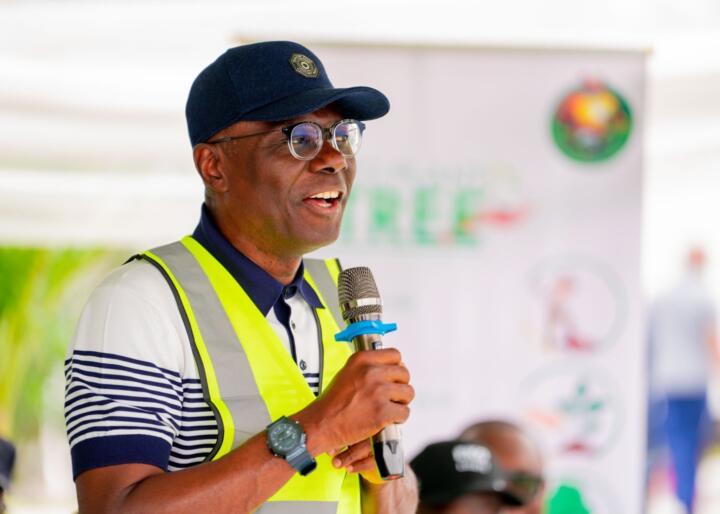The Lagos State Government has announced plans to reconstruct and modernize the Obafemi Awolowo Technology Mall in Ikeja, as part of its wider strategy to position the state as a hub for innovation, digital commerce and economic growth. Governor Babajide Sanwo-Olu revealed that the project is intended to transform the aging mall, popularly known as the Awolowo Market, into a state-of-the-art technology and retail center that will serve the needs of traders, startups, and technology-driven businesses.
Speaking through the Commissioner for Physical Planning and Urban Development, Oluyinka Olumide, the government explained that the redevelopment is aimed at revitalizing the Ikeja computer and electronics cluster, which has been instrumental in driving Nigeria’s technology trade for decades. The mall, which has housed hundreds of small-scale traders and tech vendors, has faced infrastructural decay and congestion issues that hamper its full potential. The upgrade is therefore expected to improve business efficiency, attract investors, and create a safer, more modern trading environment.

According to government officials, the new design will feature modern facilities including digital infrastructure, reliable power supply, adequate parking spaces, fire safety measures, and improved traffic management within and around the market. Plans also include provisions for incubation hubs and co-working spaces to support tech startups and entrepreneurs, ensuring that the facility serves both traditional traders and the new wave of innovation-driven businesses.
The Lagos State Government has assured traders and stakeholders that they will be fully involved in the redevelopment process to minimize disruptions and protect their interests. Meetings have been held with market associations and technology traders to discuss compensation, relocation during the construction period, and the allocation of new shop spaces once the project is completed. Governor Sanwo-Olu emphasized that the administration is not displacing businesses but enhancing the market’s value to boost economic activities in Lagos.
Industry experts have welcomed the initiative, noting that Lagos, which already contributes a significant share to Nigeria’s GDP, must continually upgrade its commercial infrastructure to maintain its competitive edge in West Africa. The Ikeja area, which houses the Computer Village — one of Africa’s largest ICT product markets — plays a crucial role in Nigeria’s digital economy. By upgrading the Obafemi Awolowo Technology Mall, Lagos aims to complement the broader ICT ecosystem and attract more foreign and local investments in the sector.
Sources from the Lagos State Urban Renewal Agency confirmed that the redevelopment project will be executed in phases to ensure minimal disruption to business operations. There will also be opportunities for private sector participation through Public-Private Partnerships (PPP), with discussions ongoing with potential investors and developers. The project is aligned with Lagos State’s 30-year development plan, which prioritizes infrastructure renewal and economic diversification.
Traders have expressed mixed reactions to the announcement. While some are optimistic that the upgrade will bring long-term benefits such as increased customer traffic, better facilities, and improved business opportunities, others have expressed concerns about temporary displacement and affordability of new shop rates post-construction. The government has, however, pledged transparency and affordability, promising that original shop owners and tenants will be given priority in the new mall.
Analysts believe the project could serve as a model for other markets in Nigeria that require modernization to meet global standards. With Nigeria’s growing e-commerce industry and increasing demand for ICT products, upgrading infrastructure in key markets like Ikeja is seen as a strategic move to strengthen Lagos’ position as the country’s economic nerve center. The reconstruction also aligns with Lagos State’s efforts to promote smart city initiatives, expand broadband penetration, and support youth-driven technology enterprises.
Governor Sanwo-Olu reiterated that the redevelopment will not only boost economic activity but also enhance the aesthetic appeal and functionality of Ikeja, the state’s capital district. He noted that the improved infrastructure will provide an enabling environment for trade and innovation while addressing safety and environmental concerns that have plagued the market over the years. Environmental impact assessments are ongoing to ensure that the project aligns with sustainability principles.
The timeline for the completion of the project has not been formally disclosed, but early reports suggest that construction could commence later in the year once all consultations and financing agreements are finalized. Upon completion, the reconstructed Obafemi Awolowo Technology Mall is expected to generate thousands of direct and indirect jobs, increase Lagos State’s internally generated revenue, and serve as a catalyst for digital transformation and economic inclusivity.
Observers point out that the reconstruction is part of Lagos’ broader infrastructural renewal efforts, which include upgrades to transportation systems, road networks, and urban markets. The project also reflects Lagos’ commitment to embracing technology as a driver of future economic growth. If successfully executed, the Awolowo Technology Mall could become a landmark center for commerce and innovation, attracting businesses not just from Nigeria but across the West African region.
With Lagos positioning itself as a smart megacity, stakeholders say the reconstruction of the mall is timely and necessary. The state government has urged all affected traders and residents to cooperate fully during the redevelopment process to ensure its successful implementation. The project represents another significant step toward making Lagos a globally competitive economic hub where technology and commerce intersect seamlessly.
Support InfoStride News' Credible Journalism: Only credible journalism can guarantee a fair, accountable and transparent society, including democracy and government. It involves a lot of efforts and money. We need your support. Click here to Donate
